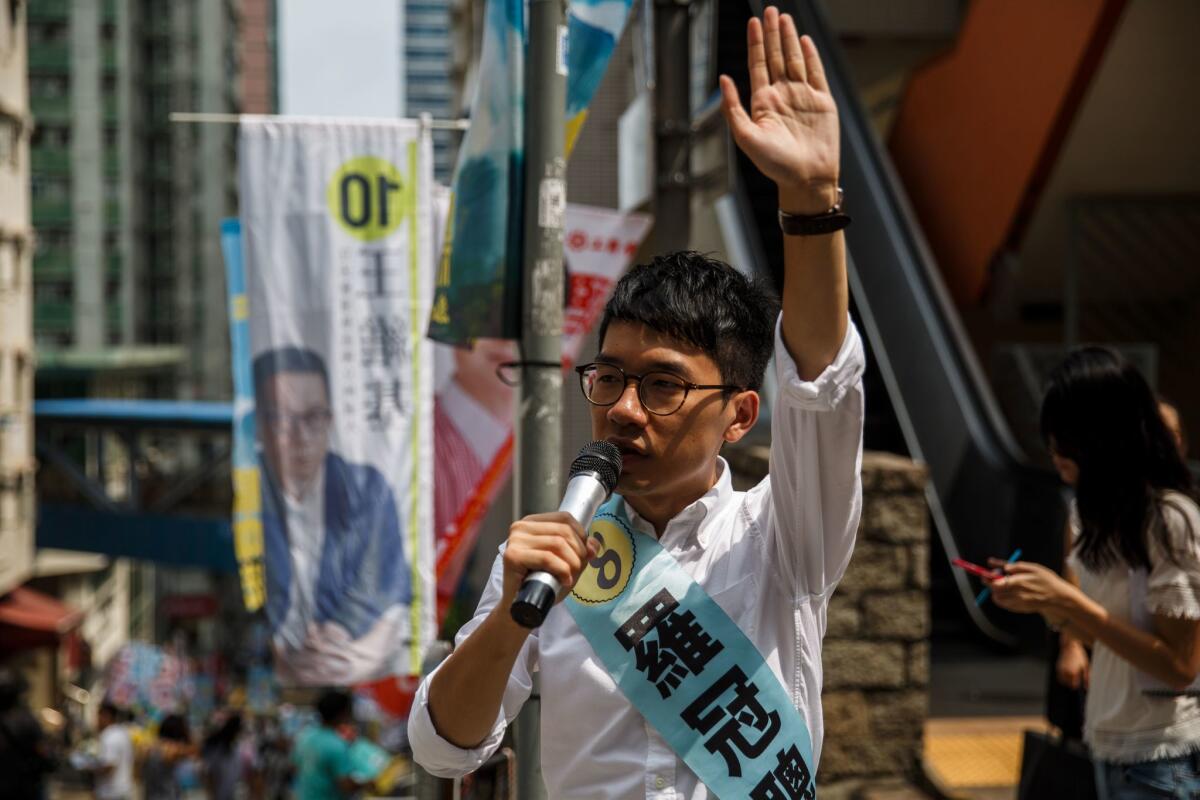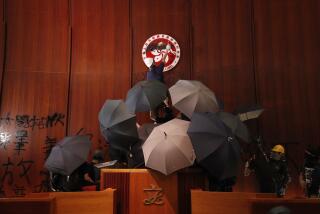Anti-Beijing forces gain momentum in Hong Kong election

- Share via
Reporting from Hong Kong — The movement for greater autonomy from mainland China gained momentum Sunday in the most important election since the 1997 handover of Hong Kong from Britain.
Votes were still being tallied Monday morning, but it was already clear that five seats in the Legislative Council were won by young activists who entered politics after the pro-democracy street demonstrations of 2014 and campaigned on promises to stand up to Beijing. A total of 10 ran, not including six who were barred.
Voters turned out in record numbers, with 2.2 million people, or 58% of the electorate, casting ballots. Some polling stations remained open a few hours past the 10:30 p.m. closing time to accommodate the crowds.
They will decide 35 of the 70 seats in the legislature, though about a dozen of those seats were uncontested. The rest of the legislators are chosen by various business interest groups dominated by pro-Beijing loyalists.
One winner was 23-year-old Nathan Law, who helped lead the 2014 protests — part of the so-called Umbrella Movement — with teenage activist Joshua Wong. Their party, Demosisto, calls for a referendum on Hong Kong’s future relationship with China, including the possibility of independence.
The other young activists who won include a university lecturer who had been arrested in February street protests, an environmentalist who opposes high-speed rail links to the mainland and two members of the upstart political party Youngspiration, which also calls for a referendum.
Before the elections, the legislature was divided between pro-Beijing loyalists and the so-called pan-Democratic bloc, whose 27 seats gave it veto power to block legislation.
Some voters have turned to the new generation of activists because they believe that the pan-Democratic faction is inadequately defending Hong Kong’s interests and autonomy.
The activists and pan-Democrats combined appear to have won far more votes than the pro-Beijing faction.
“It matters less who got elected. This is the way for voters to show after Umbrella Movement they’re turning away from pro-Beijing loyalists,” said legislator Leung Kwok-hung of the pan-Democratic camp.
Beijing-backed Hong Kong Chief Executive C.Y. Leung has said he’ll announce whether he’ll run for a second term after the elections.
Under a mini-constitution known as Basic Law, Hong Kong enjoys freedoms that go far beyond those of mainland China. That arrangement is set to expire in 2047, when the former British colony reverts to full Chinese control.
Legislators are limited to voting on bills and funding proposals put forth by the government and are not allowed to propose their own. There is no provision for a referendum of any sort.
The ban of six pro-independence candidates was based on the notion that their advocacy for independence violated the Basic Law, which states that Hong Kong is an inalienable part of China.
“This is to show if you go down on the path of advocating independence, there is no return, and you’ll be blocked by the government,” said Ching Cheong, a local political commentator. “What the Chinese Communist Party wants is to nip it in the bud, even when pro-Beijing loyalists here know this is impossible in a pluralistic society like Hong Kong.
“Even as they’re barred from running, their political demands cannot be ignored and their political appeal will only grow,” Ching said.
One of the banned candidates, Edward Leung, said in July that he might file an election petition with the court to overturn the results. That now seems unlikely, because the candidate he supported, Sixtus Leung of the Youngspiration party, won a seat.
There are other signs that their camp is gaining strength.
A recent poll by the Chinese University of Hong Kong showed that 40% of people in Hong Kong under the age of 25 support independence, though most think it is impossible.
In June 2015, the legislature rejected election rules drafted by Beijing that would have limited candidates for the 2017 election of Hong Kong’s high office to two or three Beijing loyalists.
Law is a special correspondent.
ALSO
Crowds rally for end to racist violence in France after Chinese man’s death
Mother Teresa declared a saint as Pope Francis lauds her in Vatican ceremony
Islamic State has lost all territory along the Syria-Turkey border, Turkish news agency says
More to Read
Sign up for Essential California
The most important California stories and recommendations in your inbox every morning.
You may occasionally receive promotional content from the Los Angeles Times.










